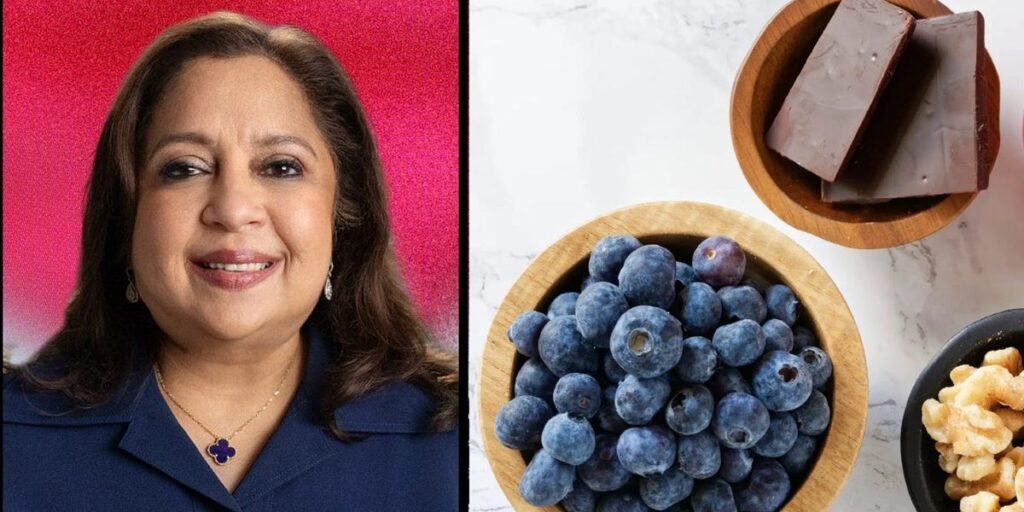Downward angle icon Downward angle icon. Foods like berries, chocolate, leafy vegetables, and nuts can support gut health while also helping to protect your brain. Courtesy of MasterClass/Getty Images/Cathy Scola Dr. Uma Naidoo is a Harvard-trained psychiatrist and professional chef. She explains why a healthy diet boosts beneficial bacteria in your gut, which in turn supports your brain. Simple grocery store staples like fresh herbs and leafy vegetables are great, as are blueberries.
According to the physician and nutrition expert, stocking up on basic ingredients from your local grocery store can help keep your brain young and your gut healthy.
Harvard-trained psychiatrist and professional chef Dr. Uma Naidoo will be appearing in Masterclass' new Brain Health class, where she will share simple tips to improve memory and focus while preventing age-related cognitive decline.
She told Business Insider that what you eat can support your digestive system while also giving your brain health and mood a major boost.
That's because your brain and gut are intimately connected: the gut is a major producer of neurotransmitters like serotonin, which are necessary for maintaining mental health and cognitive function.
“We often think of the brain as being above the neck and not connected to the rest of the body, but gut health is just as important,” Naidoo says.
The gut-brain connection shows us that eating a healthy diet can have dual health benefits, and you don't need expensive superfoods or supplements to get it: some of Naidoo's favourite brain-boosting staples on her shopping list include yoghurt, dark chocolate and fresh herbs.
“The biggest thing I really want people to take away from this class is that healthy food can be delicious,” she said, “just by adding some very simple ingredients, some easily available ingredients, whether that be leafy greens or herbs and spices.”
Yogurt and cottage cheese are rich in protein and gut-healthy probiotics.
Two of the main foods in Naidoo's fridge are plain yogurt and cottage cheese, known as probiotic foods. They're packed with beneficial bacteria obtained through the fermentation process, which aids the beneficial microorganisms that live in the human digestive system. Both yogurt and cottage cheese are also good sources of protein, which helps keep you feeling full.
The key to making yogurt or cottage cheese a healthy breakfast or snack is to be mindful of what you mix it with. Many pre-made varieties, like granola, and additives are high in sugar, which, when consumed in excess, can lead to potential health problems, including an increased risk of anxiety and depression.
Naidoo makes her own brain-healthy granola (the recipe is in her book) with nutrient-packed oats, seeds for healthy fats, and a little honey for natural sweetness.
Nuts and berries are healthy, high-fiber snacks
Popular snacks such as chips and pastries are processed foods that studies have shown can contribute to poor mood and brain function.
Naidoo's go-to snacks instead include nuts and berries, which are packed with fiber to keep digestive systems healthy.
Berries are often recommended for brain health as part of eating plans such as the MIND diet because they are rich in disease-fighting compounds called antioxidants.
“We want to take in antioxidants because they prevent oxidative stress in the body and brain,” Naidoo says.
Leafy greens may keep your brain young
Another easy way to eat healthier is to add a few servings of green leafy vegetables to your daily meals, says Naidoo.
Produce like spinach and kale are rich in nutrients like vitamin K and folate, which studies suggest may contribute to healthy aging.
Also look for microgreens such as watercress, arugula and pea shoots, which can be easily tossed into salads and other recipes to provide a boost of vitamins and minerals.
“Especially in the summer, if I come across microgreens I try to buy some as they add extra nutrients to a salad,” Naidoo says.
Dark chocolate is a brain-boosting dessert
Brain foods also include treats, such as dark chocolate, which is rich in minerals and certain nutrients called flavanols that are linked to improved cognitive function, Naidoo said.
“Not only is it a brain food, it's also low in sugar, so I try to get my patients used to having small bites of extra dark, natural chocolate instead of a candy bar,” Naidoo says.
For best results, avoid products high in sugar and other additives and look for a high cocoa content (at least 70% cocoa) to get the most out of your chocolate. It's also important to enjoy chocolate in moderation; research shows that eating too much can lead to excess sugar and calories that negate any potential health benefits.
Naidoo adds that combining chocolate with citrus fruits such as oranges or clementines makes it even more nutritious, as the vitamin C helps with iron absorption.
Fresh herbs like basil and parsley add nutrients and make healthy foods taste better.
Naidoo's training as a professional chef taught her that healthy food can be delicious, but it doesn't have to be complicated.
Stocking up on fresh herbs like basil and parsley will add extra flavor and provide additional health benefits.
In her MasterClass brain health class, Naidoo shares recipes for brain-healthy foods like Jerked Cauliflower that you can make at home. Take the time to experiment with your favorite herbs and spices to find flavors and recipes that suit your tastes and support your health.
“What's most important is that people realise how healthy food can be simple and delicious, without sacrificing flavour,” Naidoo said.



